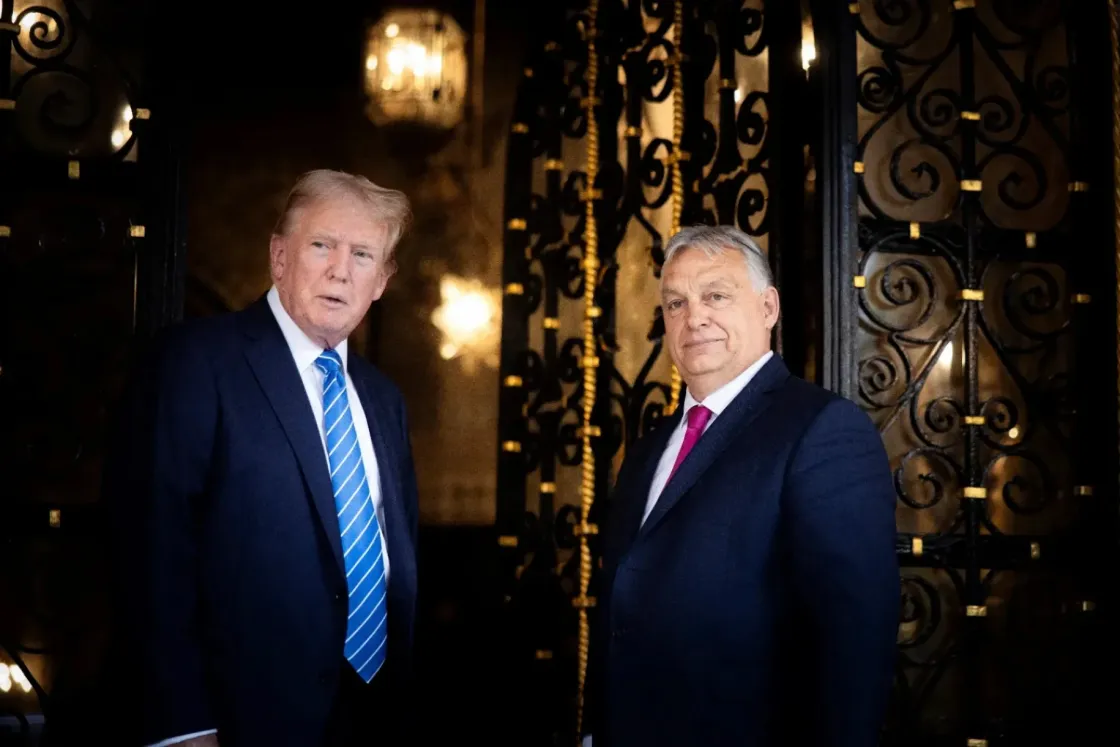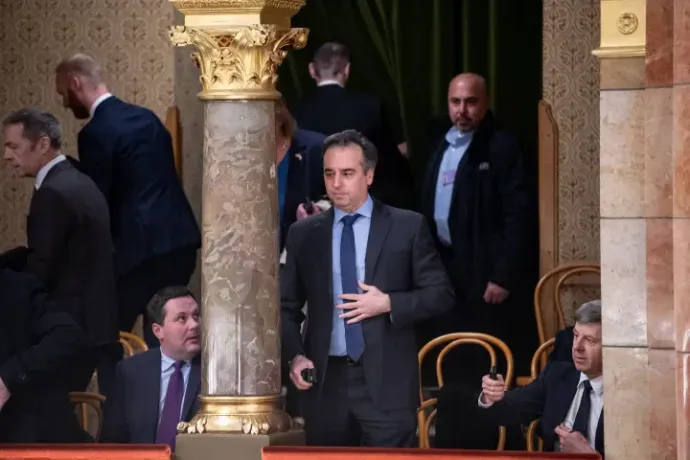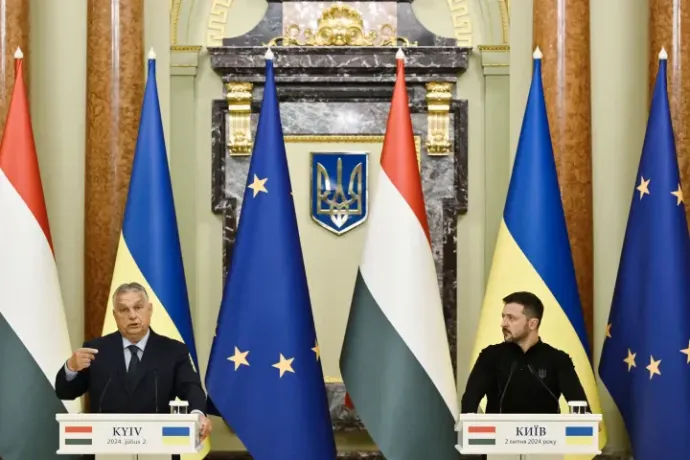If the US administration finally leaves him be because of Trump, it will already be a success for Orbán

If, unlike the Democratic administration, they do not criticize the Hungarian government and do not impose sanctions of any kind, the Orbán government will be able to regard Donald Trump's victory as a political success. That said, however, there are and there will be issues on which the new US administration is likely to pursue a policy contrary to the interests of the Hungarian government.
Hungarian-American political relations have long been at a rock bottom. David Pressman, the US Ambassador currently accredited to Budapest has been a regular and outspoken critic of the Hungarian government, which is unusual in diplomacy. Granted, the give-and-take has been mutual, as both the Orbán government and the pro-government press have frequently lashed out at the diplomat.
It can only get better, right?
Given that the messaging has mostly ignored the polite formulas common in diplomacy, the soured relationship has been obvious to those on the outside too. Echoing the views of the Democratic leadership in Washington, Pressman has regularly expressed how damaging he considers the Orbán administration's Russia policy, its statements on the war between Ukraine and Russia, and its authoritarian style of leadership. He has also criticized the Hungarian leadership on ideological issues, and has openly taken a stand on LGBTQ issues.
The openly gay ambassador who's married to his partner has previously advocated for LGBTQ rights as a lawyer, but when speaking, he has represented Washington's position. It is no coincidence that they chose to send him to Budapest, given his familiarity with national security issues as well, which is a key issue in the context of the Russia-Ukraine war and the changing geopolitical situation – at least that's what the Biden administration must have had in mind. Pressman's role is most comparable to that of André Goodfriend, the US Charge d'Affaires to Budapest, who was very active in 2014 and who also served in the Hungarian capital during a Democratic administration.
In his annual state of the nation address in February, Viktor Orbán joked about the names of US envoys to Budapest, saying that Clinton sent a "good friend" (André Goodfriend) who was replaced by a "press-man" (referring to David Pressman). The prime minister said that "humour can help get a friendship through difficult times", but he hoped that they would not "send someone called Puccini next time", suggesting quite clearly that he thought there was an intention in American politics to stage a coup.

Similarly to Pressman, Goodfriend also openly criticized the government, mostly on account of the rampant corruption – that was the time when the tobacconist scandal broke out. It was under his watch that several government figures, including Ildikó Vida, then chairwoman of the national tax authority (NAV), were banned from entering the United States. And it was also during the Goodfriend era that János Lázár, who was a senior minister at the time, made references to US intelligence agencies snooping around the families of Hungarian decision-makers.
Once upon a time there was a friendly ambassador
Although Orbán's relationship with the US leadership has not been as good as it was during his first term in office (between 1998 and 2002) for quite a while, there was a change during Trump's first presidency that could well happen again: the US ambassador who arrived in Budapest in 2018 struck a friendly note with the Hungarian government, unlike his predecessors who had been more critical of Orbán since 2010. His name was David Cornstein, and he pursued a cooperative rather than confrontational approach.
So much so that some believe Cornstein actually became a fan of Orbán. The New York Times described the diplomat as 'a Trump ambassador on the loose', suggesting that he was undermining the work of US diplomats in Hungary.
In fact, it was Cornstein who set up the meeting between Orbán and Trump in 2019, and there are also reports claiming that he developed a particularly good relationship with the cultic figure of NER, Árpád Habony, who formally holds no position in the government but is nonetheless an influential person in the system.
What is NER?
NER is short for Nemzeti Együttműködés Rendszere, meaning ’System of National Cooperation.’ The term was coined by the Orbán government after their election victory in 2010 to refer to the changes in government that they were about to introduce. By now, NER has become a word in its own right, and is used in colloquial Hungarian to refer to Fidesz' governing elite, complete with the politicians and the oligarchs profiting from the system.
This is especially relevant because Habony was one of the individuals targeted by the US in 2014 after the NAV scandal and the subsequent banning of certain persons from entering the US. In October 2014, the US denied entry to six unnamed Hungarian officials under Presidential Proclamation 7750, which suspends the right of entry to the US for persons who have engaged in or benefited from corruption. Even if not because of the NAV case, but Habony was also banned from entering the US, at least at the time. This makes it noteworthy that Habony and Cornstein ended up on good terms after that. Cornstein did not put a spoke in their wheel, visibly turning his back to the CEU (Central European University) affair. In fact, in an interview, he once described the government's campaign against the CEU as a dispute between George Soros and Viktor Orbán.
Admittedly, by Cornstein's time, the US diplomats who worked on the banning of the six individuals from entering the US were long gone from the Budapest embassy. When Trump failed to get reelected, Cornstein left too, but he did not forget the Orbán administration. Last spring, for example, he attended the CPAC Hungary conference, the Hungarian mini-edition of the annual super-conference organised by the (far) right wing of the US Republican Party, and was personally received by Viktor Orbán at the Carmelite.
Orbán has stuck by Trump
The Hungarian prime minister first met Trump in Washington in 2019 (this was the meeting set up by Cornstein), and it was clear even then that the chemistry between them was working. They spoke for 10-15 minutes longer than planned. Trump only does this when he is genuinely interested in the other person. During this meeting, Trump reportedly also asked Orbán for his view on Ukraine.
As time went on, Orbán's reputation among conservative, Trumpist Republicans continued to grow, simply because the Hungarian prime minister's party had won four consecutive elections with its anti-woke, anti-immigration, anti-liberal policies. Naturally, Orbán has also sought to build his own brand overseas. According to an article in Foreign Policy on Fidesz's relationship-building with the Republican party, Orbán has poured billions of dollars into his soft power strategy, aiming to win over American conservative thinkers.
In addition, Orbán continued to carefully build his relationship with Trump, and did not back down even after he had failed. As a former president, Trump met the Hungarian prime minister at his golf club in Bedminster, New Jersey in the summer of 2022. Orbán was accompanied by Foreign Minister Péter Szijjártó, his political director Balázs Orbán and Zsolt Németh, the Fidesz chairman of the Hungarian Parliament's Foreign Affairs Committee. Two days later, Orbán addressed the CPAC Conservative Convention in Dallas.
In March this year, Trump hosted the Hungarian prime minister for a private meeting at his Florida estate, where Orbán presented Trump's wife Melania Trump with a large bouquet of flowers while the song Pretty Woman was playing in the background. Afterwards, Trump said of Orbán: "He's the boss. He's a great leader." The two politicians spoke on the phone several times since, including this summer before the prime minister's visit to Tusványos, and most recently in late October.
Trump and Orbán have been praising each other the whole time. The former (and future) president also mentioned the Hungarian prime minister at the July Republican convention. He said Orbán was a tough prime minister who knows that both China and Russia fear Trump. And in the televised presidential debate, Trump said that “Hungarian Prime Minister Viktor Orbán is one of the most respectable leaders of the world, a really strong man, a smart man.”
They expect to be left alone
In terms of US-Hungarian relations, with Trump's return, the Orbán government expects something similar to what they experienced during Cornstein's brief tenure as ambassador. Most importantly they expect Washington to stop openly criticizing them and for relations between the two countries – on both political and ideological issues – to normalize. With Trump's victory, the Orbán administration is taking David Pressman's departure for granted, with their pundits already bidding him farewell on Wednesday with Hungarian singer György Korda's classic song "Reptér" (Airport).
Pressman did not fail to respond. At a reception held at his Zugligeti út residence on Wednesday, he criticized the Hungarian prime minister, (but not the winner of the US presidential election) for the way Viktor Orbán handled the American presidential election. The ambassador said Orbán had turned the election into a gamble, and that the stakes were not money but Hungarian-American relations, which he said was irresponsible. Pressman added that in the long run it will always be a bad idea to gamble with Hungarian-American relations. His speech can also be interpreted as a signal that Orbán's policy towards America will have long term consequences, even if they may not currently be visible.
In Orbán's reading, however, Trump's victory is not so much about long-term Hungarian-American relations as it is about the next term. And for Fidesz, this victory means above all that they will be "left alone" for a while. They expect that Washington will not hold them to account on rule of law, human rights, cultural, but most of all LGBTQ issues, and they will not have to fear government figures being subject to any sort of sanctioning over potential corruption allegations.
Some within the Democratic administration predicted such a course of events if Harris had won the presidential election. One of the dangers of such sanctions is that they could bring some of the NER's economic elite to their knees, and they do not want to be expelled from the United States, especially at a time when EU funds have been frozen by Brussels.
Indeed, if there are no sanctions from the US, and if Washington does not openly criticize the Orbán government, then the Hungarian leadership can already regard this as a success, and it could really alleviate the isolation of Hungary, which has been evident within the Western bloc for some time. The Trump administration is not likely to challenge the Hungarian government over the Sovereignty Protection Office (as Pressman did), though this would also leave said office with one less adversary, since it would no longer be able to suspect the US government's intrigue behind opposition parties, NGOs or the media. Of course, there would still be plenty of enemies left for the Sovereignty Protection Office, such as "Brussels".
If Orbán's calculations work out and Trump pushes for the start of Ukrainian-Russian negotiations after taking office, while Republicans reduce military and financial aid for Ukraine at the same time, this could also improve Hungarian-American relations. As previously reported, Orbán, and by extension the Hungarian government, would benefit from a change in US policy towards Ukraine if Trump were to put some pressure on Kyiv. On the one hand, this would both increase the significance of the prime minister's 'peace mission' and, on the other, it would allow Orbán, who is perceived in the West as too pro-Russian, to change his role and emerge as a peace broker: the politician who was of the opinion from the very beginning that Ukraine must come to an agreement with Russia – at virtually any cost.
There are still many uncertainties on this, but it is unlikely that Trump would criticize Orbán's Russia policy. In any case, it is already clear that Orbán is trying to show his American friend the way on this issue as well, as when he spoke at the Turkic Council in Kyrgyzstan on Wednesday, he said that a new European strategy on Ukraine would be needed after the Republican victory in the United States.
According to Orbán, Trump's victory "presents us, European leaders with the question of whether Europe will be able to keep up the military and financial support it has provided for Ukraine up until now". This is a clear indication that Orbán is expecting Europe to withdraw its support from the Ukrainians when US support declines. Orbán has been playing this game since the beginning of the war: first he expected a quick Russian victory, and later assumed that Europe would tire and back out from behind the Ukrainians. With Trump's victory, this could indeed happen, but since there are plenty of Republicans who are not willing to let go of Ukraine's hand, the game is not yet over.

For now, it is in the interests of both Trump and Orbán to strengthen each other, as they did throughout the campaign. It is important for the returning president to have a stable European ally, especially since Trump's return to office is expected to bring a cooling of relations between the EU and the US. This could lead to the interesting scenario that followed the outbreak of the Russia-Ukraine war. At that time, Hungary pursued a Russia policy of its own in the EU. It may very well be that during the Trump era, the Hungarian government will also follow a US policy of its own, which could further increase its isolation within the EU. Such an isolation could even be used to Orbán's advantage, as he would continue to have both an adversary and a scapegoat.
There will still be points of friction, especially over China
These are of course more political-ideological successes for Orbán, but Trump's victory does not mean that there will not be serious conflicts of interest with Washington in the future. On the contrary. But these conflicts are more likely to be of an economic rather than a political-ideological nature, even though minister Gergely Gulyás believes that in the event of a Trump presidency, there will be no economic conflict with the United States.
One of these points of contention is clearly Hungary's policy towards China, including the economic neutrality that Viktor Orbán has been advocating. Fidesz politicians have made it clear that relations with China are of strategic importance to Hungary, mainly for financial reasons. To put it very simply: the government needs Chinese money, it needs the Chinese loan. This in turn leads to dependency, which is frowned upon in Washington.
This may be relevant because Trump's China policy is much tougher than the Democrats'. And although Orbán considers Trump to be in the camp of "pro-peace" politicians, his less friendly statements towards China do not suggest that he would not take America to war in the event of a conflict in Taiwan, for example. Just as Orbán's Russia policy became a matter of national security in the eyes of the Democrats, so Hungary's relations with China could easily become a matter of similar gravity.
Of course, this is only the 'political' part of the relationship with China, but there is also an economic dimension. Trump has promised that, if elected, he would impose tariffs of up to 60 per cent on all Chinese goods and 20 per cent on most imports from anywhere else outside of the US. Even given their good relationship, it is unrealistic to think that Orbán could strike a special deal with Trump, who is pushing for high tariffs. If only because a large part of Hungary's exports to the US are part of German exports. And the little bit that is 'purely' Hungarian is not significant in terms of the economy.
For example, neither the Democrats nor the Republicans look favorably on the Budapest-Belgrade railway, the one billion euro loan taken out from Chinese banks, or the bringing in of Chinese battery and electric car factories. If anti-China voices in Washington intensify during the Trump era, it could also affect Hungarian-American relations and tensions could re-emerge. Even if this were to happen, the Orbán administration would still not need to fear that Washington will hold them to account about democracy. Corruption, on the other hand, could be an issue again, and knowing how active the FBI is in monitoring Chinese economic transactions, the Americans would have plenty of information with which to put pressure on the Hungarian government – if that were in their interest.
For more quick, accurate and impartial news from and about Hungary, subscribe to the Telex English newsletter!